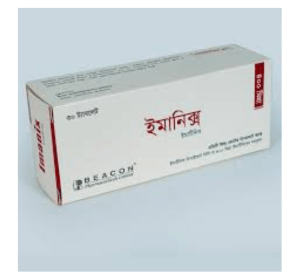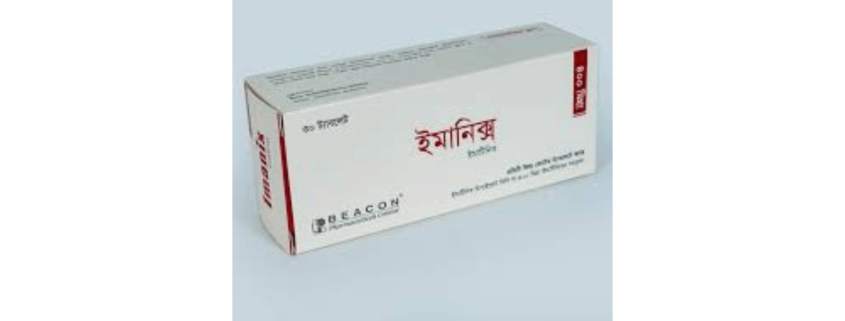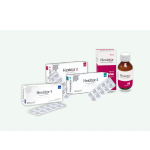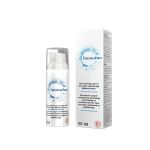Imanix

Generic Name :Imatinib
Indications
- Newly diagnosed adult and pediatric patients with Philadelphia chromosome positive chronic myeloid leukemia (Ph+CML) in chronic phase.
- Patients with Philadelphia chromosome positive chronic myeloid leukemia in blast crisis, accelerated phase, or in chronic phase after failure of interferon-alpha therapy.
- Adult patients with relapsed or refractory Philadelphia chromosome positive acute lymphoblastic leukemia (Ph+ ALL).
- Pediatric patients with newly diagnosed Philadelphia chromosome positive acute lymphoblastic leukemia (Ph+ ALL) in combination with chemotherapy.
- Adult patients with myelodysplastic/myeloproliferative diseases associated with platelet-derived growth factor receptor (PDGFR) gene re-arrangements.
- Adult patients with aggressive systemic mastocytosis without the D816V c-Kit mutation or with c-Kit mutational status unknown.
- Adult patients with hypereosinophilic syndrome and/or chronic eosinophilic leukemia who have the FIP1L1-PDGFR a fusion kinase (mutational analysis or fluorescence in situ hybridization [FISH] demonstration of CHIC2 allele deletion) and for patients with HES and/or CEL who are FIP1L1-PDGFRa fusion kinase negative or unknown.
- Adult patients with unresectable, recurrent and/or metastatic dermatofibrosarcoma protuberans.
- Patients with Kit (CD117) positive unresectable and/or metastatic malignant gastrointestinal stromal tumors.
- Adjuvant treatment of adult patients following complete gross resection of Kit (CD117) positive GIST.
Pharmacology
Imatinib is a small molecule protein-tyrosine kinase inhibitor that potently inhibits the activity of the Bcr-Abl tyrosine kinase (TK), as well as several receptor TKs: Kit, the receptor for stem cell factor (SCF) coded for by the c-Kit proto-oncogene, the discoidin domain receptors (DDR1 and DDR2), the colony stimulating factor receptor (CSF-1R) and the platelet-derived growth factor receptors alpha and beta (PDGFR-alpha and PDGFR-beta). Imatinib can also inhibit cellular events mediated by activation of these receptor kinases.
Absorption and Distribution: Imatinib is well absorbed after oral administration with Cmax achieved within 2-4 hours post-dose. Mean absolute bioavailability is 98%. Mean Imatinib AUC increases proportionally with increasing doses ranging from 25 mg to 1,000 mg. There is no significant change in the pharmacokinetics of Imatinib on repeated dosing, and accumulation is 1.5- to 2.5- fold at steady state when Imatinib is dosed once-daily. At clinically relevant concentrations of Imatinib, binding to plasma proteins in in vitro experiments is approximately 95%, mostly to albumin and 1-acid glycoprotein.
Metabolism: CYP3A4 is the major enzyme responsible for metabolism of Imatinib. Other cytochrome P450 enzymes, such as CYP1A2, CYP2D6, CYP2C9, and CYP2C19, play a minor role in its metabolism. The main circulating active metabolite in humans is the N-demethylated piperazine derivative, formed predominantly by CYP3A4. It shows in vitro potency similar to the parent Imatinib. The plasma AUC for this metabolite is about 15% of the AUC for Imatinib. The plasma protein binding of N-demethylated metabolite CGP74588 is similar to that of the parent compound.
Excretion: Imatinib elimination is predominately in the feces, mostly as metabolites. Based on the recovery of compound(s) after an oral 14C-labeled dose of Imatinib, approximately 81% of the dose was eliminated within 7 days, in feces (68% of dose) and urine (13% of dose). Unchanged Imatinib accounted for 25% of the dose (5% urine, 20% feces), the remainder being metabolites. Following oral administration in healthy volunteers, the elimination half-lives of Imatinib and its major active metabolite, the N-demethyl derivative (CGP74588), are approximately 18 and 40 hours, respectively.
Dosage & Administration
Adults with Ph+ CML CP: 400 mg/day
Adults with Ph+ CML AP or BC: 600 mg/day
Pediatrics with Ph+ CML CP: 340 mg/m2/day
Adults with Ph+ ALL: 600 mg/day
Pediatrics with Ph+ ALL: 340 mg/m2/day
Adults with MDS/MPD: 400 mg/day
Adults with ASM: 100 mg/day or 400 mg/day
Adults with HES/CEL: 100 mg/day or 400 mg/day
Adults with DFSP: 800 mg/day
Adults with metastatic and/or unresectable GIST: 400 mg/day
Adjuvant treatment of adults with GIST: 400 mg/day
Patients with mild to moderate hepatic impairment: 400 mg/day
Patients with severe hepatic impairment: 300 mg/day
All doses of Imatinib should be taken with a meal and a large glass of water. Doses of 400 mg or 600 mg should be administered once daily, whereas a dose of 800 mg should be administered as 400 mg twice a day. Imatinib can be dissolved in water or apple juice for patients having difficulty swallowing. Daily dosing of 800 mg and above should be accomplished using the 400-mg tablet to reduce exposure to iron.



